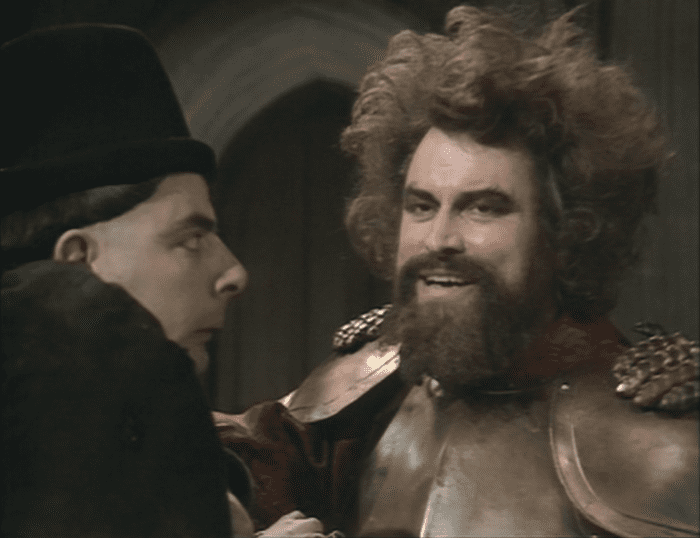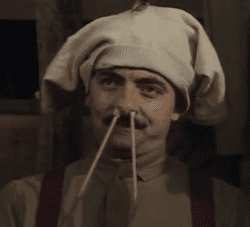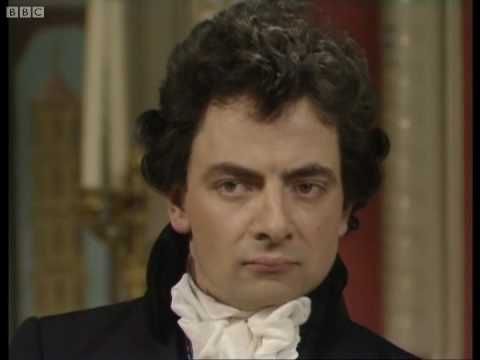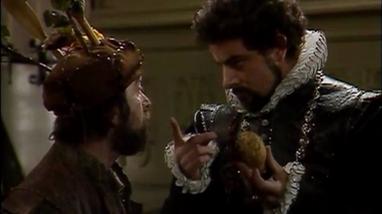I want to be remembered when I’m dead. I want books written about me. I want songs sung about me. And then hundreds of years from now I want episodes of my life to be played out weekly at half past nine by some great heroic actor of the age.
EDMUND BLACKADDER
Edmund Blackadder certainly got his wish. 40 years ago, on June 15th 1983, BBC1 aired the first installment of a risky new historical comedy set in the middle ages and, without knowing it, launched what was to become an indelible British comedy institution. The wit and savage one-liners have passed from British generation to generation almost as a rite of passage, with a simple mention of the show instantly eliciting a variety of favoured lines from people, with words and lines such as “Bob”, “wibble”, and “I have a cunning plan” sounding like a secret code to the uninitiated but creating joyful remembrance in everyone else.
There are many reasons for the show’s success; the historically playful, wonderfully farcical plots sharply written by Ben Elton and Richard Curtis; a great wealth of acting talent (Rowan Atkinson as the titular Blackadder, Tony Robertson, Miranda Richardson, Gabrielle Glaister, Stephen Fry, Hugh Laurie, to name a few); the mix of acidic wit and Python-esque silliness; and an excellent supporting cast of characters (Baldrick, Melchitt, Percy/Darling, Queenie, Nursie, Mrs Miggins, George—the list goes on!)
However, the main reason the show is so enduringly popular lies in its namesake: Edmund Blackadder. The titular character has slithered into the hearts of fans worldwide and stayed there, becoming a treasured friend, even though we know he’d get Baldrick to steal the family silver if we gave him a chance.
Proving that often the most likeable comedy characters are the ones that don’t have many typically ‘likeable’ characteristics, Edmund Blackadder has won mass affection by being a scheming, plotting, arrogant, obnoxiously clever, charming little toad. We wouldn’t have him any other way. Without a character as strong as Edmund, Blackadder would likely still have been a very good show, but it would not have captured people’s affections in the same way.
Here’s why I believe Edmund Blackadder is such a Compelling Character.
He’s as Downtrodden as the Rest of Us
Fortune vomits on my eiderdown once more.
EDMUND BLACKADDER
Of all the qualities Blackadder can be described as having, I strangely don’t think I’ve ever heard him described as being relatable. And yet, for what I’d assume is a lot of us, he really is. Maybe that’s a sad or a cynical comment on how I view society, I don’t know, but Blackadder really is as downtrodden and put upon as all of us.

That might initially seem a strange assertion: in The Black Adder, he is Prince Edmund, Duke of Edinburgh, the King’s son. In Blackadder II, he is a member of Elizabeth I’s Royal Court. But while undoubtedly privileged, Blackadder, like a lot of us, constantly finds himself at the mercy of institutions that quite often see him as an inconvenience, a joke or something to use for amusement.
In The Black Adder, Edmund is an object of scorn for his family, with his father (who we soon find out is not his real father) not even being able to remember Edmund’s name (“Edgar” and “Egbert” are my favourite variations). Blackadder is not allowed to take on any royal tasks of any importance—unless you consider ensuring the eunuchs turn up as entertainment to a feast an important task. The one time Edmund did get a role of any real importance, he was made the Archbishop of Canterbury—a role with a life expectancy of only several weeks due to the conflicts the role causes with the Crown!
Furthermore, the King has no hesitation to reward a soldier in his service by stripping Blackadder’s titles from him and giving them to the soldier without considering Edmund whatsoever. From beyond the grave, the dead King Richard III called Blackadder a horrid little scabby reptile, and we can safely assume that the rest of the family concur. Edmund’s father went in fact one better: “You, compared to your beloved brother Harry, are as excrement is compared to cream.” Very nice.
In Blackadder II, Edmund is theoretically in a better position. No longer burdened by his family, who we never see in this series, Blackadder is now a Lord, part of the Royal Court of Queen Elizabeth I. He has his own house and a manservant, the brain cell-defying Baldrick. But if his predecessor (who, according to the script book The Whole Damn Dynasty, was this Edmund’s Great-Grandfather) was put upon by his family, the Edmund of Blackadder II is arguably put upon by his boss.
The Queen Elizabeth I of Blackadder II is a giddy, mischievous, irascible schoolgirl of a character, all compulsion and no filter. Imagine a cheeky, funny English version of Veruca Salt and you’ve got the idea. Throughout Blackadder II, Queenie toys with Blackadder, putting him in awkward situations and making him sweat for apparently no other reason than it amuses her and that the mood happened to take her that way at the moment. As such, although a romantic attraction between the pair is teased throughout the season, Queenie makes Edmund’s life plenty difficult just because she can. She makes Blackadder Lord High Executioner, knowing that no one lasts more than a week in the role; she loses interest in Edmund as soon as Sir Walter “Ooh, what a big ship I’ve got” Raleigh turns up; promises Edmund that she’ll marry him if he sails around The Cape of Good Hope, only to tell Edmund that she’s changed her mind when he returns two years later (!) and that she’ll have him executed if he hasn’t got her a present; and repeatedly tricks Edmund out of money, more for a joke than anything else. With friends like that, who needs enemies?
Blackadder II sets the precedent for the Blackadder-boss antagonistic relationship that would define the following two series. Blackadder the Third sees Edmund in the Georgian era as a butler to the Prince Regent, working for a man with more socks than brains (and Edmund’s been stealing his socks to sell!) Prince George is never nasty to Blackadder but a clear class division is evident throughout. Blackadder’s position is to serve the Prince and as such has barely any of the money or privilege that the Prince enjoys.
This sticks in Blackadder’s craw because Edmund is acutely aware of his intelligence and cannot understand why someone as clever as him is in such a lowly position while someone as intensely stupid and incompetent as Prince George has everything, simply by right of his family line. Blackadder has greatness in him: Dr Johnson, he of ‘The Dictionary’ fame, in reviewing Blackadder’s novel (written under the nome de plume Gertrude Perkins), “Edmund: A Butler’s Tale”, calls it “the only book in the world that is even better (than mine)”. High praise indeed. So, of course, the book is accidentally burnt by Badrick and it’s back to the kitchen for Blackadder. Stupidity wins the day, at Blackadder’s expense.

By the time of Blackadder Goes Forth, Edmund has become a Captain in the British Army in the First World War and is playing out the ultimate boss-worker conflict: the soldier ordered to go over the top to his certain death by his Generals but doing everything he can to disrupt orders and prevent the loss of his own life. Blackadder is once again the smartest man in the room, his superiors being shockingly dumb (Stephen Fry’s hilarious General Melchit being particularly challenged). It is curious, and I’m sure it’s a comment on the war itself, that for all his attempts to escape battle, there is a certain calm, weary resignation to Blackadder here. He knows that in this war you can only escape death for so long, but ultimately the bosses will win and death will claim you—as it does at the end of the last episode.
Anyone who has had a difficult family relationship or has struggled at work with bosses and co-workers who you know you can do a better job than can relate to Blackadder. He might move in more privileged circles on occasion but he’s still shat upon by circumstance like a lot of us. That Blackadder can express this in such strong comedic terms and even allow Edmund to win on occasion opens the character up to great affection from the audience.
Of course, great character is not built just on the circumstances one finds themselves in but on how they react to it all, and what action they take.
Which brings me to…
He’s a Cunning Schemer (With or Without a Cunning Plan)
I’m afraid my ambitions stretch slightly further than professional idiocy in West London.
EDMUND BLACKADDER
Blackadder might feel like his life is “strewn with cow pats from the devil’s own satanic herd”, but he does do his best to make other people lie down in said cow pats so he can step over them. What is quite heroic about Blackadder is that, while his bitterness, self-interest and acidic tongue do not make him a likeable person on an objective level, we still take to him on the level of an anti-hero, someone who talks back to his antagonists and schemes against them in a way that we would like to in our lives but often cannot. He takes victories, some big, some small, against those that would put him in his place, and that allows us to live vicariously through him, kicking against the bosses, institutions and irritants of our lives in symbolic form on the screen.
This is most prevalent in Blackadder Goes Forth, where Captain Blackadder’s schemes are mainly focused on defying the generals who went to send him to his certain death. Sometimes these are successful, although not in the way intended; Edmund plots to use Lieutenant George’s artistic skills to take on a war artist’s job and get away to Paris: when this turns out to be a ruse to find a person to sketch no man’s land, Blackadder fakes his way into a position of General Melchitt’s chef, missing the Big Push (and getting Baldrick to feed Melchit ‘custard’ from a cat into the bargain).
Other times, Edmund’s schemes go dreadfully wrong. He joins the “Twenty Minuters”, a division of the Flying Corps, believing it to be the amount of actual time the division spends in the air. Expecting an easy life, Blackadder is sorely disappointed and terrified by the fact that the ‘Twenty Minuters’ are so-named because 20 minutes is the life expectancy for the pilots in the division. Blackadder only lives after his plane is shot down because he is captured and then broken out of prison by the madcap, flamboyant pilot Lord Flasheart. Even then, Blackadder’s ideas don’t go to plan. He tries to stay behind in the prison by claiming his leg is hurt, knowing full well that as a prisoner of war he is likely to live longer than he would being sent over the top of the trenches.

Sometimes it appears Blackadder is going to succeed in his scheming ways. In Blackadder the Third, Pitt the Younger intends to remove Prince George from the Civil List, cutting off his wealth and therefore Blackadder’s wealth, seeing as the butler is making a tidy profit selling George’s fancy socks off behind the Prince’s back. Blackadder plots a scheme where Baldrick is elected as a dummy MP for a Rotten Borough, with Edmund installing himself as the Acting Returning Officer for the borough and somehow casting 16,472 votes as the borough’s only voter—“very
sadly, accidentally brutally cut his head off while combing his hair”. All’s fair in love and politics.
Except Baldrick votes the wrong way, forcing the issue of George’s expulsion to The House of Lords. Blackadder sees a way to not only keep Prince George on the Civil List but get himself a position of prestige in the bargain. Suggesting that Prince George nominates someone to the House of Lords to influence voting, Blackadder in his hubris buys himself a Lord’s coat and preens himself like a peacock, fully expecting it to be him that is to be made a Lord. Edmund, however, had not taken into account Prince George’s stupidity and alas, it is Lord Baldrick in his place. A massive turnip on the head for Baldrick in revenge can only bring slim satisfaction, I imagine…
It’s not all doom and gloom for Blackadder, however—he does sometimes see success. Sometimes this is an unforeseen consequence of his plotting and not the way he planned things at all; sometimes he achieves exactly what he intended. A fine example of the first happens around the aforementioned boat trip around the Cape of Good Hope. Not only has Blackadder taken on this impossible task so as to take the shine away from Walter Raleigh, but he is also trying to impress Queenie and obtain her promised hand in marriage. However, by the time of Edmund’s return, Queenie is bored with explorers and demands gifts. Edmund’s head appears to be on the proverbial chopping block, especially as Queenie throws away her gifted boomerang in disgust. Luckily for Edmund, the boomerang returns and cracks Percy in the back of the head, instantly impressing the Queen. Blackadder is back in the Queen’s good graces again, his life spared, and even if the marriage seems to be off, Edmund has Queenie’s attention again. Success.
In the case of the “baby-eating” Bishop of Bath and Wells, who behind the backs of his congregation works for the Bank of the Black Monks and collects owed money from borrowers by threatening to insert a red-hot poker where the sun doesn’t shine, Edmund takes a while to hit upon the ideal solution (why he ever thought the idea of pimping out the foul Baldrick to sailors for a good hard shag would ever work is beyond me!), but once he does, it’s a masterstroke. Understanding that he can only get the Queen to believe in the Bishop’s sinful ways if she sees the evidence, Blackadder drugs the Bishop, knocks him out, and then poses him in perverted, degraded acts with Percy dressed as what I can only describe as the look of a sadomasochistic chili pepper! While you can argue that the Queen could accuse the painting of being a lie, it seems to do the job: the Bishop agrees to wipe Blackadder’s debt and give him the money to buy back his house and some extra cash to spend with.
Good things eventually come to those who plot—and we love Blackadder all the more for it.

He Has the Best One-Liners and Insults in Comedy History
Before we conclude, it would be amiss of me not to mention the most celebrated thing of all when it comes to Edmund Blackadder: his waspish tongue. No doubt a result of his bitterness at those around him, Blackadder’s conversation is peppered with insults, one-liners some very curious similies that are amongst some of the finest bon mots in the English language and certainly some of the most loved lines in British comedy history. Eminently quotable and perfectly delivered by Rowan Atkinson, a sheer mention of Blackadder’s wit is enough to drive even the most casual fan into releasing an involuntary torrent of Edmund’s choicest lines.
Let me leave you with some of my favourite examples of Blackadder’s repartee. I can’t think of a better way to celebrate Edmund Blackadder on his fortieth anniversary!
- “The eyes are open, the mouth moves, but Mr Brain has long since departed, hasn’t he, Percy?”
- “They do say, Mrs M, that verbal insults hurt more than physical pain. They are, of course, wrong, as you will soon discover when I stick this toasting fork into your head.”
- “Baldrick, believe me, eternity in the company of Beelzebub and all his hellish instruments of death will be a picnic compared to five minutes with me – and THIS pencil.”
- “Baldrick, you wouldn’t recognise a subtle plan if it painted itself purple and danced naked on a harpsichord singing ‘subtle plans are here again’.”
- “Whatever it was, I’m sure it was better than my plan to get out of this by pretending to be mad. I mean, who would have noticed another madman round here?”
- “Baldrick, does it have to be this way? Our valued friendship ending with me cutting you up into strips and telling the prince that you walked over a very sharp cattle grid in an extremely heavy hat?”
- “Unfortunately most of the infantry think you’re a prat. Ask them who they’d rather meet, Squadron Commander Flasheart or the man who cleans out the public toilets in Aberdeen, and they’d go for Wee Jock Poo-Pong McPlop every time”.
- “Give the likes of Baldrick the vote and we’ll be back to cavorting druids, death by stoning and dung for dinner, of course.”
- “Your disguise is as convincing as a giraffe wearing dark sunglasses trying to get into a polar bear’s only golf club”.
-
“This is the worst moment of my entire life, I spent my last penny on a cat-skin wind-cheater, I’ve just broken a priceless turnip and now I’m about to be viciously slaughtered by a naked Tunisian sock merchant. All I can say Baldrick, is this; it’s the last time I dabble in politics”.

